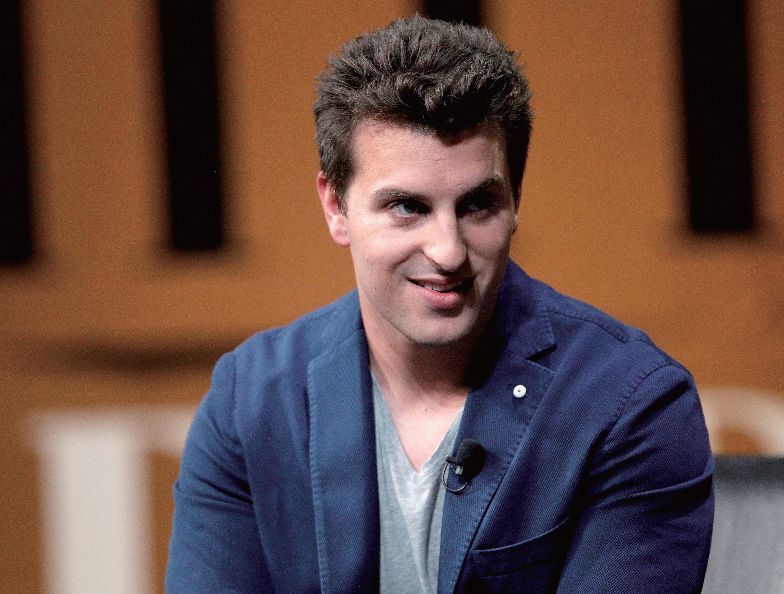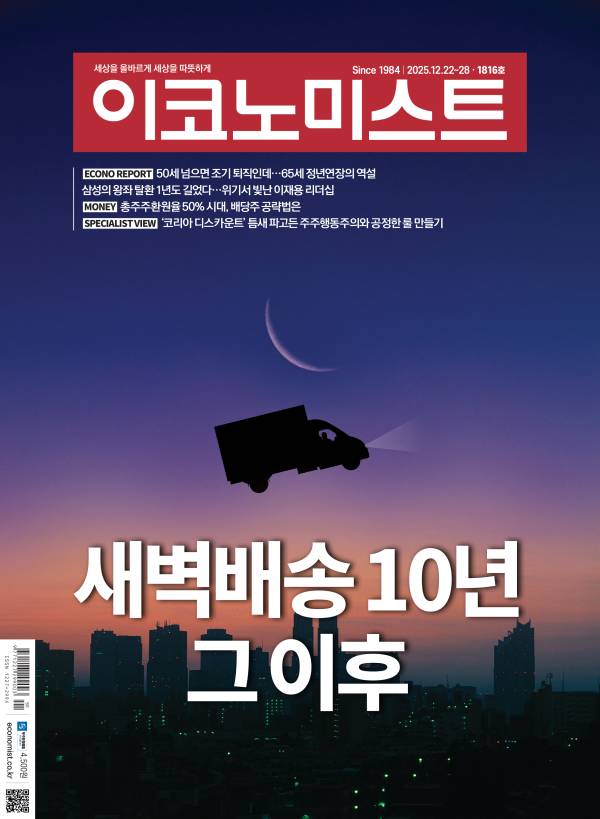- ‘비공감’ 아이디어가 대박 난다

HAVE A REALLY GREAT BAD IDEA
The best ideas in tech these days are the ones everyone agrees are stupid...until they’re not.Sitting across from me for our interview, AirbnbCEO Brian Chesky demonstrated why artificial intelligence robots won’t take over the job of entrepreneur anytime soon.
No robot would ever be as crack-brained and heedless as Chesky was at his company’s beginning—actually, as any entrepreneur must be today. In this warped era of company creation, the only good business ideas are really bad ideas. Code that into an IBM Watson and watch its circuits melt.
The interview with Chesky took place at New York University, in front of an audience of mostly students who someday want to start companies. Chesky retold Airbnb’s creation story. He and Joe Gebbia, recent graduates of the Rhode Island School of Design turned jobless roommates in San Francisco, couldn’t afford their rent. A major design conference was coming to town, and hotels were sold out. The roommates blew up three airbeds and put up a website offering to rent them out and serve cereal in the morning. Hence AirbedAndBreakfast.com.They got three paying customers.
“Does that sound like a big idea?” Chesky quipped. “I remember someone saying to me, ‘Don’t worry about your idea. If it’s any good, everyone will dismiss it.’”
I’ve been hearing a lot of that lately. Bryan Roberts, a venture capitalist at Venrock, told me he has to look for what he calls non-consensus ideas. These companies have to have “something most people think you can’t surmount, or that if you do surmount, no one will care.” Snapchat, for instance, falls into that latter category. Early on, a lot of people wondered why anyone except sexting teenagers would care about a service that disappears their naked selfies. Today, the company is valued at $16 billion. Go figure.
Why search for non-consensus? In this era of constant connectivity and social media, everyone knows what everyone else is doing instantly. Cloud services and open-source soft ware allow anybody with an idea to get it up and running quickly for very little money. Add all that together and the second an idea seems sane, 30 companies are already doing it and fighting for attention, investment and customers. That’s not the kind of business that’s going to blow up into a multibillion- dollar, world-changing enterprise.
A non-consensus company like Airbnb or Snapchat buys time in the shadows to build a business that hardly anyone thinks is worth building. Then another phenomenon of our ultra-connected age kicks in. As Roberts says, “Things go from non-consensus to consensus very quickly, but by then you [the company] have some competitive advantage that’s hard to surmount.” Nobody sees it, and then—boom!—it’s everywhere, constantly tweeted, liked, pinned and shared. Slack, Dropbox, YouTube—you’ve watched it happen a hundred times. For Airbnb, that takeoff moment came in 2011. Today, Airbnb offers more rooms than Hilton, Marriott and Hyatt combined. It’s been valued at $25.5 billion.
The speed is what’s new. Non-consensus ideas have always driven the greatest innovations. (When King Gillette started selling disposable safety razors in 1904, most men wondered why they’d give up their straight razors.) But in the past, starting a business often involved manufacturing, and word spread by advertising. The conversion to consensus was more like a journey than a light switch. New gadgets could be protected by patents for decades. Today, a fraction of startups even file for a patent. There’s no time. The better protection is having potential competitors think you’re nuts for just long enough that they can’t catch up once you prove you’re not.
The challenge of searching for non-consensus ideas, then, is separating good non-consensus ideas from ideas that just plain suck. In the earliest stages, as when Chesky was renting blow-up beds, the two look the same. In honest moments, every investor or entrepreneur will tell you they can’t tell the difference. Chesky’s advice: “You just have to build a solution for a problem in your own life.” Solve your own small problem, and it might later scale to solve a lot of people’s bigger problems.
In fact, when you think about it, the legendary entrepreneurs have understood that their jobs weren’t just to invent something. That may be the easy part, the part someone like Chesky can stumble into. The real job is changing people’s minds. A non-consensus idea by definition has no demand. No one thinks he wants or needs it. Inventing Airbnb was one thing. Convincing a mass market that it’s wonderful to stay in other people’s homes while traveling has been the company’s real victory.
This circles back to worries that AI will get so smart it will take over all our jobs. Days before talking with Chesky, I met with Joseph Sirosh, who’s developing machine learning at Microsoft. He discussed how machines are getting amazingly good at predicting what to do next based on past data. They can suck up all the medical research and patient data ever created and diagnose a rare disease most doctors wouldn’t even know about.
But great non-consensus ideas come from the opposite direction. As Sirosh said, past data will always show that a non-consensus idea will fail. Use AI to analyze Airbnb in 2008 and it would’ve suggested Chesky stick to his other idea, making politically themed breakfast cereal. Chesky and Gebbia actually funded Airbnb by selling boxes of Obama O’s and Cap’n McCain’s.
In this modern age, the great value of humans—our ultimate triumph—seems to be our willingness to do things that make absolutely no sense.
‘비공감’ 아이디어가 대박 난다
실리콘밸리에선 아무도 거들떠보지 않는 창업 아이템이 수십억 달러의 기업가치 창출해숙박공유 서비스 에어비앤비의 브라이언 체스키 CEO와 인터뷰를 하는 자리에 마주 앉았다. 그는 왜 인공지능 로봇이 한동안은 벤처기업가의 일자리를 빼앗을 수 없는지 입증했다.
창업 초기의 체스키 CEO만큼 무분별하고 무모한 로봇은 없을 것이기 때문이다. 실상 체스키 CEO뿐 아니라 어느 벤처기업인이라도 마찬가지일 듯하다. 요즘처럼 상식을 뛰어넘는 회사 창업의 시대엔 정말 어처구니없어 보이는 아이디어들만이 세상에 혁신을 몰고 온다. 그런 아이디어를 IBM의 인공지능 슈퍼컴퓨터 왓슨에 입력하면 회로가 망가진다.
체스키 CEO와의 인터뷰는 뉴욕대학에서 진행됐다. 우리 앞에 자리 잡은 청중은 창업을 희망하는 학생들이 대부분이었다. 체스키 CEO는 에어비앤비의 창업 스토리를 풀어놓았다. 그와 조 게비아는 로드아일랜드 디자인 스쿨을 갓 졸업한 뒤 샌프란시스코에서 방을 빌려 함께 지내는 백수 룸메이트였다. 방세를 낼 돈이 없었다. 어느 날 시내에서 대규모 디자인 컨퍼런스가 열리는데 호텔 방이 동났다. 두 사람은 에어 침대 3개에 바람을 넣은 뒤 웹사이트를 구축해 침대를 빌려주고 조식으로 시리얼을 제공한다는 광고를 냈다. AirbedAndBreakfast.com은 그렇게 탄생했다. 3명의 고객을 받았다.
“굉장한 아이디어처럼 들리나요?” 체스키는 스스로의 질문에 이렇게 답했다. “누군가 말하더군요. ‘자네 아이디어에 관해서는 걱정하지 말아. 아무도 거들떠보지 않는 아이디어가 좋은 아이디어야.”
최근에 벤록의 벤처자본가 브라이언 로버츠는 ‘비공감(nonconsensus)’ 아이디어를 찾아야 한다고 내게 말했다. 이런 회사들은 “다른 사람은 뛰어넘을 수 없거나 또는 뛰어넘는다 해도 아무도 관심을 갖지 않으리라고 흔히 생각하는 뭔가”를 분명 갖고 있다. 예컨대 모바일 메신저 서비스 스냅챗이 후자에 해당된다. 처음에는 섹스팅(휴대전화를 통한 섹스 관련 문자나 사진 주고받기)하는 십대들 아니면 누가 자신의 알몸 셀카 사진을 사라지게 하는 서비스에 관심을 갖겠느냐고 많은 사람이 의구심을 품었다. 오늘날 스냅챗의 기업가치는 160억 달러에 달한다.
왜 그런 비공감 아이디어를 찾을까? 요즘처럼 항상 인터넷과 소셜미디어에 연결된 시대에는 남들이 무엇을 하는지 누구나 금방 알 수 있다. 클라우드 서비스와 오픈소스(원천기술 공개) 소프트웨어 덕분에 아이디어가 있는 사람은 짧은 시간에 극히 적은 돈으로 회사를 차리고 사업을 시작할 수 있다. 이런 요인들을 종합해 보면 어떤 아이디어가 그럴싸해 보이는 순간 30개 회사가 벌써 자리를 잡고 관심·투자·고객을 끌어들이려 경쟁을 벌인다. 그런 사업은 세상을 뒤집어엎는 수십억 달러 규모의 혁신을 일으키지 못한다.
에이비앤비와 스냅챗 같은 ‘비공감’ 기업은 음지에서 몸을 낮춘 채 해볼 만한 가치가 없는 사업을 펼칠 때를 기다린다. 그러다가 초연결 시대의 또 다른 혁신이 모습을 드러낸다. 벤처 자본가 로버츠의 말마따나 “극히 짧은 시간에 비공감에서 공감으로 인식이 바뀔 때쯤 그 회사는 뛰어넘기 힘든 경쟁 우위를 누리게 된다.” 아무도 알아차리지 못하다가 한 순간 ‘펑!’ 터진다. 트윗, 좋아요(페이스북), 핀(핀터레스트), 공유를 통해 순식간에 사방으로 퍼져나간다. 슬랙(업무용 메신저), 드롭박스(파일 공유 서비스), 유튜브 등 우리는 그런 사례를 숱하게 목격했다. 에어비앤비의 경우 그런 비약의 순간이 2011년에 찾아왔다. 오늘날 에어비앤비가 제공하는 방의 수는 힐튼·매리어트·하얏트 호텔을 합친 숫자보다 많다. 기업 가치는 255억 달러다.
달라진 부분은 속도다. 비공감 아이디어는 원래부터 최대 혁신을 이끄는 원동력이었다(1904년 킹 질레트가 일회용 안전 면도기 판매를 시작했을 때 대다수의 남성은 접이식 일자 면도기를 왜 버려야 하는지 의아해 했다). 그러나 과거엔 사업을 시작하려면 종종 생산을 하고 광고를 통해 제품을 널리 소문내야 했다. 공감 아이디어로의 전환은 전등 스위치 올리기보다 장기 여행에 더 가까웠다. 발명품은 특허권으로 수십 년 동안 보호받을 수 있다. 오늘날 특허권 신청에 관심을 갖는 신생 벤처는 극히 일부에 지나지 않는다. 그럴 시간이 없다. 그보다는 제품이 공감으로 전환할 때까지 잠재적 경쟁자들이 계속 정신 나간 아이디어로 생각하도록 만들어 따라잡지 못하게 만드는 방법이 더 나은 방어수단이다.
그렇다면 비공감 아이디어 탐색의 최대 과제는 평범한 아이디어 속에서 주옥 같은 비공감 아이디어를 가려내는 것이다. 체스키 CEO가 에어 침대를 임대하던 창업 초기 단계에는 다른 점이 없어 보인다. 솔직히 말하라면 투자자든 벤처기업가든 차이를 모르겠다고 말할 것이다. 체스키 CEO의 조언을 들어보자. “자기 인생의 문제에 대한 해결책을 찾으면 된다.” 자신의 사소한 문제를 해결하다 보면 훗날 많은 사람이 안고 있는 더 큰 문제를 해결하는 해법으로 확대될 수 있다는 말이다.
실제로 돌이켜보면 전설적인 벤처기업가들은 단순히 뭔가를 발명하는 것만이 자신의 일은 아니라는 사실을 이해했다. 거기까지는 쉬운 부분일지 모른다. 체스키 CEO 같은 사람이 우연히 그런 행운을 만날 수도 있다. 진짜 과제는 사람들의 사고방식을 바꾸는 일이다. 비공감 아이디어에는 속성상 수요가 없다. 아무도 그것을 원하거나 필요하다고 생각하지 않는다. 에어비앤비 구상은 시작에 불과했다. 여행 중 다른 사람의 집에 묵는 일이 멋진 경험이라고 대중시장을 설득한 것이 그 회사의 진짜 성공비결이었다.
이쯤에서 우리 이야기는 원점으로 돌아간다. 인공지능이 우리 일자리를 모두 앗아가리라는 우려 말이다. 체스키 CEO와 인터뷰 하기 며칠 전 마이크로소프트에서 기계학습 기술을 개발하는 조셉 시로쉬를 만났다. 그는 과거의 데이터에 기초해 앞으로 무엇을 할지 예측하는 기계들의 능력이 얼마나 놀라운 수준으로 발전했는지 설명했다. 기계들이 이제껏 생성된 의학연구와 환자 데이터를 모조리 빨아들여 대다수 의사가 알지도 못하는 희귀병을 진단할 수 있다고 한다.
그러나 뛰어난 비공감 아이디어는 그 반대 쪽에서 나온다. 시로쉬의 말대로 과거의 데이터는 언제나 비공감 아이디어가 실패한다고 말해준다. 인공지능으로 2008년의 에어비앤비를 분석하면 체스키 CEO에게 다른 아이디어를 택하라고 제안했을 것이다. 대선 후보 테마의 조식 시리얼을 만드는 일 말이다. 체스키와 게비아는 실제로 ‘오바마 O’ 와 ‘캡틴 매케인(당시 존 매케인이 공화당 대선 후보였다)’ 시리얼 박스를 판매해 에어비앤비 자금을 조달했다.
요즘 세상에선 인간의 최대 가치(우리의 궁극적인 강점)는 터무니없는 일을 해내려는 의지인 듯하다.
- KEVIN MANEY NEWSWEEK 기자 / 번역 차진우
ⓒ이코노미스트(https://economist.co.kr) '내일을 위한 경제뉴스 이코노미스트' 무단 전재 및 재배포 금지










![면봉 개수 → 오겜2 참가자 세기.. 최도전, 정직해서 재밌다 [김지혜의 ★튜브]](https://image.isplus.com/data/isp/image/2025/12/21/isp20251221000019.400.0.jpg)
![갓 잡은 갈치를 입속에... 현대판 ‘나는 자연인이다’ 준아 [김지혜의 ★튜브]](https://image.isplus.com/data/isp/image/2025/11/21/isp20251121000010.400.0.jpg)



당신이 좋아할 만한 기사
브랜드 미디어
브랜드 미디어
금값·은값에 이어 백금 가격도 사상 최고치
세상을 올바르게,세상을 따뜻하게일간스포츠
일간스포츠
일간스포츠
현직 세무사 “박나래, 엄마 ·전 남친에 준 급여… 횡령 소지 있어” [왓IS]
대한민국 스포츠·연예의 살아있는 역사 일간스포츠일간스포츠
일간스포츠
일간스포츠
석화 구조개편 본격화에도…업계 “버틸 체력 부족” 우려
세상을 올바르게,세상을 따뜻하게이데일리
이데일리
이데일리
[마켓인]‘1.7% 격차’ 좁힌 고려아연…MBK·영풍, 남은 5일 시나리오는
성공 투자의 동반자마켓인
마켓인
마켓인
'플루빅토 독점 구조 흔들까'…효능·부작용 앞세운 셀비온, 5400억 정조준
바이오 성공 투자, 1%를 위한 길라잡이팜이데일리
팜이데일리
팜이데일리